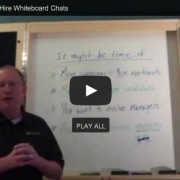Exit Interviews
It is never easy when talent leaves an organization voluntarily or even involuntarily. It takes time, money and lots of effort to replace the departed employee. Reallocating the departed employee’s tasks to other workers is also a hard task. Understanding why an employee leaves is an essential part of effective leadership. As turnover increases, the morale of the employees decreases within the organization. If a company can find out the reasons why employees are leaving, that provides valuable information that can be used to change the strategic design of employee relations within the company.
One instrumental way to collect this information is to conduct an exit interview with departing employees. While it might be too late to retain departing employees who were an asset to the company, the departing employee might share overlooked perspectives that can help the company retain other employees who are on the brink of leaving. Leadership needs to cast aside avoidance of employee candor. Host exit interviews with departing employees with the goal that acquiring potentially brutal commentary can help reduce the likelihood of hearing more of that candor in the future.
What is an exit interview?
An exit interview is a conversation between the departing employee and key leadership. Key leadership often includes Human Resources personnel or another designated neutral leader. If the departing employee’s manager participates in the exit interview, it could lead to the employee withholding key details about why they are leaving in fear of confrontation. The purpose of an exit interview is to understand why an employee is voluntarily leaving in order to reduce future turnover.
An ideal time frame for this interview is within the last two weeks of the departing employee’s last day of employment or around the midpoint between the employee’s departure announcement and their official last day. Ideally, having the exit interview as a face-to-face conversation is preferred. However, as more employees are remote and/or housed in different locations that might be geographically challenging to meet, online meeting tools can be used. The important item is to conduct an exit interview before the employee leaves.
How to conduct an exit interview:
Be consistent. All voluntarily departing employees, hourly and salary, long-term and short-term, should have an exit interview, including seasonal employees. Confidentiality is crucial to getting applicable information that can be used to make positive change within an organization. However, confidentiality cannot be guaranteed in certain situations such as turnover in a small company. Or if the departing employee indicates that criminal action (ex. harassment, theft, etc.) has been observed. When exit interviews allude to potential criminal activity within an organization, it is essential to get the company’s legal team involved for guidance. ExactHire does not provide legal counsel so check with your company’s legal team regarding specific items to include within exit interviews.
Consider having a list of standard questions that are asked to each departing employee. Other questions can be included that are pertinent to the role, department and employee. Take notes, but maintain focus on the departing employee’s thoughts. Exit interviewers must be skilled in active listening. Active listening is the concept of being fully engaged with the other person in a conversation. The goal is not listening to respond; it is listening to understand. Time is of the essence so the exit interviewer should ask the most crucial questions in which feedback is desired.
Exit Interview Questions
To collect information on certain items like policies, training, etc., consider supplementing the exit interview with a link to a survey where the departing employee can include additional feedback and ratings. Create a questionnaire for distribution as needed, and store data in your company’s onboarding platform. In the personal exit interview, here are ten questions that can be asked to the departing employee to prompt the departing employee to share relevant information:
- What made you start looking for a new opportunity?
- What solidified your decision to accept your new role?
- What could have influenced your decision to stay with our company?
- Would you recommend others to work for our company? Why? Why not?
- What recommendations do you have for our company to improve?
- What are your thoughts about the direction of your department? Company?
- How could your manager have supported you better? Supported the department better?
- What are your least favorite parts about working here? Most favorite parts?
- Did you previously share any of your concerns and challenges discussed today with management and/or HR? If yes, what was their response?
- What concerns or comments would you like to share?
Attitude
In the exit interview, be gracious and listen to what the departing employee says, even if it is not what is desired to hear. Empathy is a must. The employee is leaving voluntarily because their needs were not met. An exit interview gives the employee a chance to share their thoughts on why the decision to leave was made. Candidly, it can give the departing employee peace of mind that they shared a piece of their mind. The employee will be feeling a gamut of emotions: sadness or happiness they are leaving, frustration or excitement about the pending change, along with fear and uncertainty of what is next with the current and future company.
The exit interviewer(s) need to understand why, and be cognizant that in the departing employee’s eyes, the company did not fully meet their needs and not take offense at that. Do not burn the bridge in how you respond to the departing employee. That departing employee could become a boomerang employee and rejoin the company’s workforce again in the future.
Conclusion
Ultimately the purpose of an exit interview is for the company to acquire information about how to improve and to strengthen the relationship between the departing employee and the company. Showing genuine concern for the comments shared and appreciation for the time spent at the organization will hopefully leave the departing employee with a strengthened positive perception of the company. Word-of-mouth can help or hinder recruitment for an organization. No company wants to be perceived as a stressful and horrible place to work. Take the knowledge obtained from exit interviews to ensure that past, present and future employees observe a company committed to the success of their most valuable asset – people.









